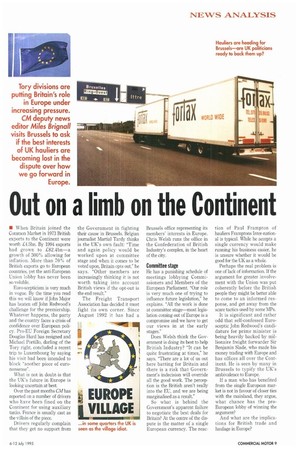Out on a limb on the Continent
Page 11

If you've noticed an error in this article please click here to report it so we can fix it.
• When Britain joined the Common Market in 1973 British exports to the Continent were worth .f4,5bn. By 1994 exports had grown to ,E82.4bn—a growth of 300% allowing for inflation. More than 70% of British exports go to European countries, yet the anti-European Union lobby has never been so voluble.
Euro-scepticism is very much in vogue. By the time you read this we will know if John Major has beaten off John Redwood's challenge for the premiership. Whatever happens, the party and the country faces a crisis of confidence over European policy. Pro-EU Foreign Secretary Douglas Hurd has resigned and Michael Portillo, darling of the Tory right, concluded a recent trip to Luxembourg by saying his visit had been intended to block "another piece of eurononsense".
What is not in doubt. is that the UK's future in Europe is looking uncertain at best.
Over the past months CM has reported on a number of drivers who have been fined on the Continent for using auxiliary tanks. France is usually cast as the villain of the piece.
Drivers regularly complain that they get no support from
the Government in fighting their cause in Brussels. Belgian journalist Martial Tardy thinks is the UK's own fault: "Time and again policy would be worked upon at committee stage and when it comes to be voted upon, Britain opts out," he says. "Other members are increasingly thinking it is not worth taking into account British views if the opt-out is the end result"
The Freight Transport Association has decided it must fight its own corner. Since August 1992 it has had a Brussels office representing its members' interests in Europe. Chris Welsh runs the office in the Confederation of British Industry's complex, in the heart of the city.
Committee stage
He has a punishing schedule of meetings lobbying Commissioners and Members of the European Parliament "Our role is very much one of trying to influence future legislation," he explains. "All the work is done at committee stage—most legislation coming out of Europe is a compromise and we have to get our views in at the early stages."
Does Welsh think the Government is doing its best to help British Industry? "It can be quite frustrating at times," he says. "There are a lot of us out here batting for Britain and there is a risk that Government's indecision will override all the good work. The perception is the British aren't really into the EU, and we are being marginalised as a result."
So what is behind the Government's apparent failure to negotiate the best deals for Britain? At the centre of the dispute is the matter of a single European currency. The reac
tion of Paul Frampton of hauliers Framptons Inter-national is typical. While he accepts a single currency would make running his business easier, he is unsure whether it would be good for the UK as a whole.
Perhaps the real problem is one of lack of information. If the argument for greater involvement with the Union was put coherently before the British people they might be better able to come to an informed response, and get away from the scare tactics used by some MPs.
It is significant and rather odd that self-confessed Eurosceptic John Redwood's candidature for prime minister is being heavily backed by millionaire freight forwarder Sir Benjamin Slade, who made his money trading with Europe and has offices all over the Continent. He is seen by many in Brussels to typify the UK's ambivalence to Europe.
If a man who has benefited from the single European market is not in favour of closer ties with the mainland, they argue, what chance has the proEuropean lobby of winning the argument?
And what are the implica. tions for British trade and haulage in Europe?




































































































